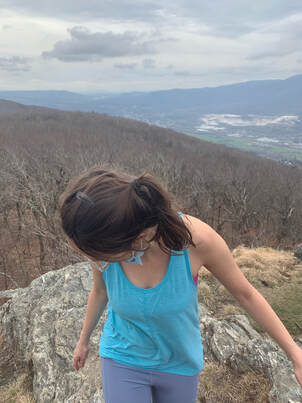
Hi, I'm Becca. I am the non-fiction book critic of the Washington Post, an editor at The Point, and a contributing editor at The Boston Review . My essay collection, All Things Are Too Small, was published Metropolitan Books in the US and Virago in the UK in April 2024. The New York Times called it "splendidly immodest" and "exhilarating" and The Guardian called it "bracing and brilliant." It was a New York Times editors' pick and a New Yorker weekly recommendation. Finally, I am also a PhD candidate (on indefinite hiatus) in philosophy at Harvard, but i remain perhaps delusionally convinced that someday I will finish my dissertation. These days I live in Washington, DC, with this person, whom I love. Here you can find all of my Washington Post pieces, which will come out each week, generally speaking.
To keep up with my writing/rantings, subscribe to my substack here. As a writer: I have contributed essays, book reviews, and the occasional art review to publications like The TLS, The Nation, The New York Times Book Review, The New Yorker, The Atlantic, Liberties, Bookforum, Art in America, The Yale Review, The Baffler, and more. These days, I write mostly for the Washington Post about non-fiction, but occasionally I write essays on fiction and whatever else for other venues. I am the winner of the first annual Robert B. Silvers Prize for Literary Criticism (see more here) and the 2023 Nona Balakian Citation for Excellence in Reviewing (see more here). In 2017, I was a finalist for a National Magazine Award in the essays/criticism category. A few authors I especially love are Joseph Roth, Italo Svevo, Henry James, Henry Green, Heinrich von Kleist, Marie de France, and Norman Rush. My agent is Anna Sproul-Latimer of Neon Literary. As a (lapsed?) philosopher: I am primarily interested in aesthetics (especially aesthetic value and its relationship to other types of value), the philosophy of love and sex, and the history of German philosophy, especially Martin Heidegger, although I have increasingly consuming secondary interests in political philosophy. In "The Good, the Bad, and the Ugly," published in The British Journal of Aesthetics, I defend aestheticism, the view that aesthetic value is sometimes a partial grounds of moral value. I describe aestheticism in more detail in a chapter in the Oxford Handbook of Ethics and Art. If I ever get around to completing it, my dissertation will be about some combination of the following: what it is to be a beautiful person, why evolutionary psychologists are wrong about human beauty, the ethics of exclusionary romantic/sexual/aesthetic preferences, and what role the state should play in ameliorating inequitable distributions of intimate "goods." I hold a first-class MPhil in the history and philosophy of science from the University of Cambridge and a B.A., summa cum laude with high honors, from Dartmouth College, where I studied philosophy & German (and cultivated an enduring distaste for fraternities). I receive many emails asking for advice about graduate school applications. I have answered some frequently asked questions on this page. As I note there, I do not consider myself an expert in how to write a successful graduate school application, and I urge all prospective grad students to consult resources online, as well as supervisors who have served on admissions committees, rather than me! Before the pandemic, I followed Hegel in regarding nature as geistlos, but now, like any good Heideggerian, I am a big fan of hiking. Here I am in the Berkshires, which I love
|
|
What was it like in the lost lands of Rezzori’s youth? Mostly, it seems, it was light there. In Rezzori’s loosely autobiographical novel An Ermine in Czernopol (1958), his narrator eulogizes a childhood in which “everything seemed sharper, brighter, and more intense.” In The Snows of Yesteryear, Rezzori announces that “with the end of the Austro-Hungarian monarchy, a light was extinguished that until then had bathed the days in a golden sheen.” And in Abel and Cain, a nearly nine-hundred-page colossus out from New York Review Books this spring, another wistful Pan-European reports that his first memories are full of “light falling obliquely through a large window, slanting across a bright room.”
Even the spring of 1938, when Hitler marched into Vienna, was eerily luminous. The early days of Nazism were blessed with “Hitler weather,” “an icy cold blue sky and a Sunday glow.” Is the harsh glint of “Hitler weather” part of what Rezzori, in the guise of his narrators, misses? He never says as much. But after all his talk of glitter and glow, I can’t help but wonder. Read more here.
0 Comments
The novel is a durable form, no matter how many time its death has been declared,” writes Lorentzen. The novel is not dead—not even moribund—because novels have only ever seriously interested a small but fiercely interested (and fiercely quarrelsome) group of marginal weirdos. Their survival does not depend on their capacity to command a mass audience but rather on their capacity to captivate cachectic devotees. Criticism, too, is a durable form. Its best practitioners, perverse lovers of hating, have always constituted an embittered, embattled minority. And aren’t we at least lucky to live at a time when there’s so much to loathe? Read the whole thing (and my co-contributers' contributions) here.
|
Archives
June 2022
Categories |

 RSS Feed
RSS Feed